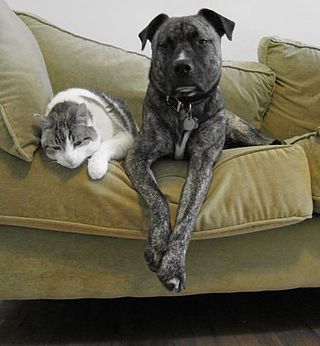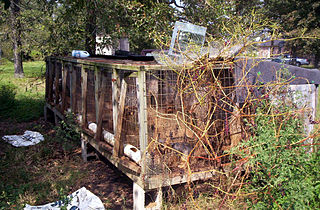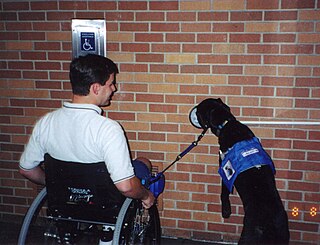
A pet, or companion animal, is an animal kept primarily for a person's company or entertainment rather than as a working animal, livestock, or a laboratory animal. Popular pets are often considered to have attractive/cute appearances, intelligence, and relatable personalities, but some pets may be taken in on an altruistic basis and accepted by the owner regardless of these characteristics.

A trust is a legal relationship in which the owner of property gives it to another person or entity, who must manage and use the property solely for the benefit of another designated person. In the English common law, the party who entrusts the property is known as the "settlor", the party to whom it is entrusted is known as the "trustee", the party for whose benefit the property is entrusted is known as the "beneficiary", and the entrusted property is known as the "corpus" or "trust property". A testamentary trust is an irrevocable trust established and funded pursuant to the terms of a deceased person's will. An inter vivos trust is a trust created during the settlor's life.
The American Society for the Prevention of Cruelty to Animals (ASPCA) is a non-profit organization dedicated to preventing animal cruelty. Based in New York City since its inception in 1866, the organization's mission is "to provide effective means for the prevention of cruelty to animals throughout the United States."

Pet adoption is the process of transferring responsibility for a pet that was previously owned by another party. Common sources for adoptable pets are animal shelters, rescue groups, or other pet owners. Some organizations give adopters ownership of the pet, while others use a guardianship model wherein the organization retains some control over the animal's future use or care.

An animal shelter or pound is a place where stray, lost, abandoned or surrendered animals – mostly dogs and cats – are housed. The word "pound" has its origins in the animal pounds of agricultural communities, where stray livestock would be penned or impounded until they were claimed by their owners.

A puppy mill, also known as a puppy farm, is a commercial dog breeding facility characterized by quick breeding and poor conditions. Although no standardized legal definition for "puppy mill" exists, a definition was established in Avenson v. Zegart in 1984 as "a dog breeding operation in which the health of the mill’s dogs is disregarded to maintain a low overhead and maximize profits". They are cited as being a result of increased demand for household pets, especially after World War II. The Veterinary Medical Association of the Humane Society of the United States defines the main characteristics of a puppy mill as "emphasis on quantity over quality, indiscriminate breeding, continuous confinement, lack of human contact and environmental enrichment, poor husbandry, and minimal to no veterinary care."

A humane society is a group that aims to stop cruelty to animals. In many countries, the term is used mostly for societies for the prevention of cruelty to animals (SPCA). In the United Kingdom, and historically in the United States, such societies provide waterway rescue, prevention and recovery services, or may give awards for saving human life.

Animal hoarding, sometimes called Noah syndrome, is keeping a higher-than-usual number of animals as domestic pets without the ability to properly house or care for them, while at the same time denying this inability. Compulsive hoarding can be characterized as a symptom of a mental disorder rather than deliberate cruelty towards animals. Hoarders are deeply attached to their pets and find it extremely difficult to let the pets go. They typically cannot comprehend that they are harming their pets by failing to provide them with proper care. Hoarders tend to believe that they provide the right amount of care for them. The American Society for the Prevention of Cruelty to Animals provides a "Hoarding Prevention Team", which works with hoarders to help them attain a manageable and healthy number of pets.

An animal control service or animal control agency is an entity charged with responding to requests for help with animals, including wild animals, dangerous animals, and animals in distress. An individual who works for such an entity was once known as a dog catcher, but is generally now called an animal control officer, and may be an employee or a contractor – commonly employed by a municipality, county, shire, or other subnational government area.
Animal euthanasia is the act of killing an animal humanely, most commonly with injectable drugs. Reasons for euthanasia include incurable conditions or diseases, lack of resources to continue supporting the animal, or laboratory test procedures. Euthanasia methods are designed to cause minimal pain and distress. Euthanasia is distinct from animal slaughter and pest control.

A dog park is a park for dogs to exercise and play off-leash in a controlled environment under the supervision of their owners.
In law, vesting is the point in time when the rights and interests arising from legal ownership of a property are acquired by some person. Vesting creates an immediately secured right of present or future deployment. One has a vested right to an asset that cannot be taken away by any third party, even though one may not yet possess the asset. When the right, interest, or title to the present or future possession of a legal estate can be transferred to any other party, it is termed a vested interest.

In common law jurisdictions, probate is the judicial process whereby a will is "proved" in a court of law and accepted as a valid public document that is the true last testament of the deceased, or whereby the estate is settled according to the laws of intestacy in the state of residence of the deceased at time of death in the absence of a legal will.
In some countries there is an overpopulation of pets such as cats, dogs, and exotic animals. In the United States, six to eight million animals are brought to shelters each year, of which an estimated three to four million are subsequently euthanized, including 2.7 million considered healthy and adoptable. Euthanasia numbers have declined since the 1970s, when U.S. shelters euthanized an estimated 12 to 20 million animals. Most humane societies, animal shelters and rescue groups urge animal caregivers to have their animals spayed or neutered to prevent the births of unwanted and accidental litters that could contribute to this dynamic.

The loss of a pet or an animal to which one has become emotionally bonded oftentimes results in grief which can be comparable with the death of a human loved one, or even greater, depending on the individual. The death can be felt more intensely when the owner has made a decision to end the pet's life through euthanasia. While there is strong evidence that animals can feel such loss for other animals, this article focuses on human feelings, when an animal is lost, dies or otherwise is departed.
Beginning in March 2007, there was a widespread recall of many brands of cat and dog foods due to contamination with melamine and cyanuric acid. The recalls in North America, Europe, and South Africa came in response to reports of kidney failure in pets. Initially, the recalls were associated with the consumption of mostly wet pet foods made with wheat gluten from a single Chinese company.

Service animals are working animals that have been trained to perform tasks that assist disabled people. Service animals may also be referred to as assistance animals or helper animals depending on the country and the animal's function. Dogs are the most common service animals, having assisted people since at least 1927.
An emotional support animal (ESA) is an animal that provides support to individuals with a mental health or psychiatric disability. Emotional support animals are not required to be trained. Any animal that provides support, comfort, or aid, to an individual through companionship, unconditional positive regard, and affection may be regarded as an emotional support animal.
Abandoned pets are companion animals that are either inadvertently or deliberately abandoned by their owners, by either dumping the animals on the streets, leaving them alone in a vacant property, or relinquishing them at an animal shelter.
Pet leasing is the practice of leasing a pet, usually a dog, to a customer on a contract basis. The practice is controversial, because some customers believed they were taking out loans to buy a pet when, in fact, they were only leasing an animal that could be repossessed by the lender in the event that payments were not kept up.










